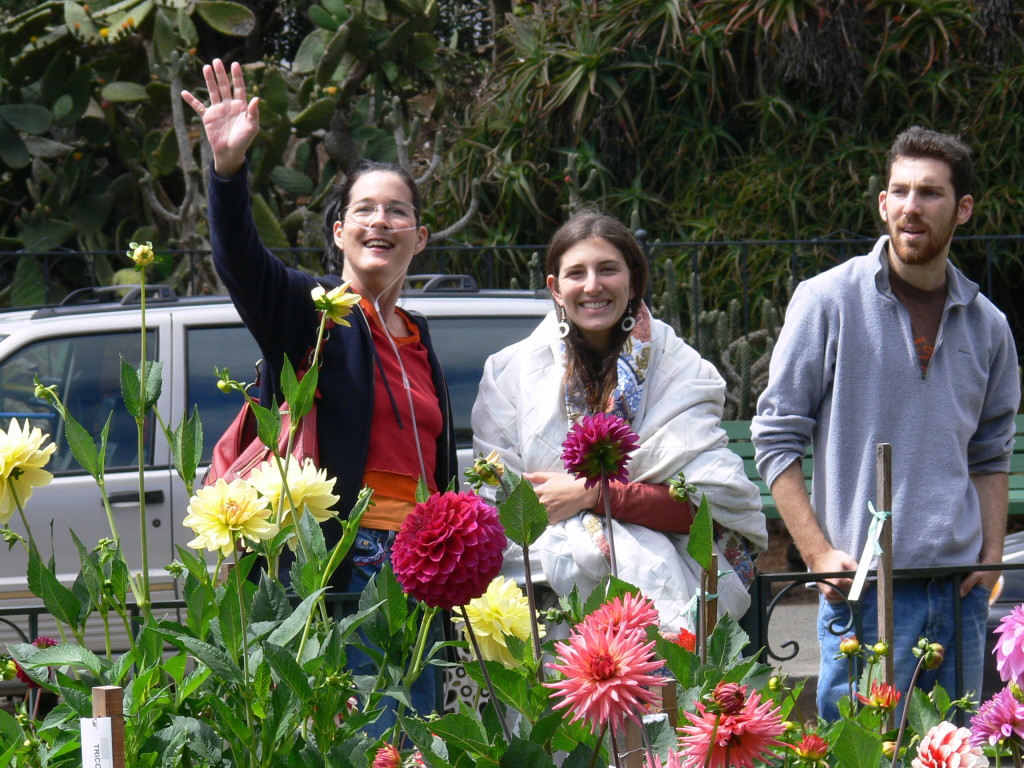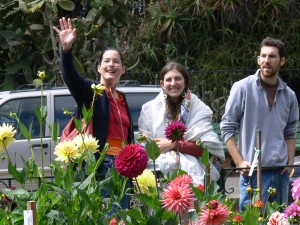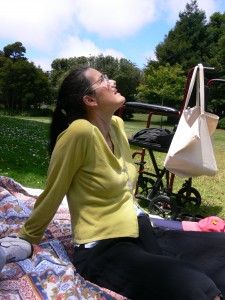|
|
November 17, 2015
Terrorism. Roast turkey with stuffing. Refugees. Sweet potatoes with marshmallows. Fear. Trust. Violence. Kindness. We need Thanksgiving more than ever. But who gets the invite and who doesn’t?
 Hello, dear friend. You are welcome. A few years back, my dear friend Bettina was having health issues and emailed: “I know this is incredibly presumptuous and Miss Manners would be scandalized, but I’m wrangling for an invitation for Thanksgiving.” (Yes, she actually wrote that.)
I couldn’t believe she assumed she’d crossed the line by saying, “I’m not feeling well and I don’t want to be alone. Can I come over?” I called immediately and gave her top marks for asking for what she needed. She was relieved knowing she’d done the right thing by speaking up.
Most of us are quicker to stand up for others than for ourselves. On some level we must believe it’s a sign of weakness to ask for support. But where does that foolishness come from? Not long ago I asked a bunch of 6th-8th graders to rate themselves on two statements: “It’s easy for me to ask for help” and “I lie and pretend things are OK when they aren’t.” The results? Twenty-five percent of the kids said it was “never or almost never” easy to ask for help. Another 25 percent reported that “sometimes” they had trouble asking for help. Another sad finding: A whopping 83 percent admitted that “sometimes, always, or almost always” they fudge the truth and pretend things are OK when they aren’t.
An inability to ask for help, coupled with a habit of pretending things are fine when they’re not, is unhealthy. When we deny our human need to connect heart-to-heart we short-change ourselves and the people who love us.
Teaching kids to be good people includes helping them get comfortable asking for support. Sure, self-reliance is essential, so is resilience and learning to calm yourself when stressed. But inner resources aside, we all feel vulnerable at times. We are also interdependent. When we let people know how we feel and allow them to love us and help us, we honor our humanity. We do the same when we welcome others to our table, our classroom, our community.
When Bettina reached out to me, I was filled with love for her. I wanted to help, but our family was heading out of town for Thanksgiving. With my encouragement she confidently expressed her needs to another friend who gladly opened his heart and home. What would surely have been a sad and lonely day for her turned into a wonderful experience of friendship and a sense of belonging.
Less than two years later Bettina died. I’m comforted knowing she wasn’t alone that Thanksgiving. I admired her courage in reaching out and asking for what she needed. She taught me a powerful lesson: When it comes to friends and family, hold nothing back. Allow yourself to love and be loved fully, without limits.
Happy Holidays, from our family to yours.
 Peace

November 7, 2013
Like I said on Monday, I’m keeping my writer’s brain fixed on the goal of completing a 50,000 word novel by midnight November 30th. In case you want proof that I’m actually working on that novel and not simply eating mint chip ice cream and reading the message boards for The Voice message, you can take my word for it: I’m actually writing a novel. Since I’ve never done this before, it still sounds kinda cool to say it. If you need more than my word, here’s the official word count: as of this moment, said novel has been stuffed with 11,346 words, each one hand-crafted and personally seasoned by me.
So… yeah, I’m busy writing, but still thinking about my blog readers. So here’s an old blog making a come-back for all of you who’re wondering if you’ve got room at your Thanksgiving table to squeeze in one more person (Yes, you do.)
Asking for Love in the Right Places
 Hello, friend. You're in the right place. Right before Thanksgiving a few years back, my dear friend Bettina, who was having health issues, emailed me: “I know this is incredibly presumptuous and Miss Manners would be scandalized, but I’m wrangling for an invitation.” (Yes, Bettina actually wrote those kind of emails. Sometimes she actually spoke that way too.)
I was blown away. Not by her directness (God no!), but by her assumption that she had no right to say to a close friend, “I’m not feeling well and I don’t want to be alone. Can I come over?” Immediately I called and thanked her for trusting me to understand her vulnerability. I also gave her top marks for the way she had honored herself by asking for what she needed. She was relieved to hear that she’d done the right thing by speaking up.
Most of us are much quicker to stand up for others than for ourselves. On some level we must believe we don’t deserve to get our emotional needs met. But where does that foolishness come from? Here’s my theory . . .
Babies are irresistibly cute so adults fall hard and take good care of them. Once they’ve gotten their sweet baby hooks into our hearts, they are experts at expressing their physical and emotional needs, nonverbally. As our children grow, our conversations with them center mostly on the physical aspects of life: Sweetheart, are you hungry? Do you want something to drink? Is it nap time? Why don’t you put on a sweater? As a result, asking for tangible stuff is very easy for kids: Dad, I need a ride. Mom, I need you to sign this. I need a new phone. I need money.
Because most parents don’t teach kids about expressing emotional needs, teens rarely say: I need a hug. I need to share this exciting news! I need you to listen. I need you to tell me the truth. I need help.
I asked a bunch of sixth–eighth graders to rate themselves on these two statements: “It’s easy for me to ask for help” and “I pretend things are OK when they aren’t.” The results? Twenty-five percent of the kids said it was “never or almost never” easy to ask for help. Another 25 percent reported that “sometimes” they had trouble asking for help. And here’s another sad finding: A whopping 83 percent admitted that “sometimes, always, or almost always” they pretend things are OK when they aren’t.
An unwillingness to ask for help, coupled with a habit of pretending things are fine when they’re not, is unhealthy. When we deny our human need to connect heart-to-heart, we end up short-changing ourselves and the people we’re closest to.
A parent’s role is to raise an emotionally healthy young adult. That includes helping a child recognize what s/he’s feeling and learning to ask for support when needed. Of course self-reliance is essential and being able to calm yourself at times of stress is a life skill, but there’s no denying that we all feel vulnerable at times. It’s also true that we’re all interdependent. When we let people know how we feel and allow them to love us and help us, we honor our humanity. We do the same when we love and help others.
On that Thanksgiving, my family was heading out of town so our home would be cold and dark. As much as I wanted to, I couldn’t offer Bettina a warm place at our table. But with my encouragement, she was confident enough to express her needs to another friend who gladly opened his heart and home. What would surely have been a sad and lonely day for her, turned into a wonderful occasion.
Less than two years later, Bettina died. Thinking about her, then and now, I’m comforted knowing that she wasn’t alone on one of her last Thanksgiving holidays. She was brave enough to reach out and ask for what she needed. Bettina taught me a powerful lesson, especially important when we’re vulnerable: When it comes to friends and family, hold nothing back. Allow yourself to love and be loved fully, without limits.
Happy Holidays, from our family to yours.

November 3, 2013
November is National Novel Writing Month: Write a 50,000 word novel by midnight the 30th. It’s not a contest, just an awesome opportunity to do more than talk about that book you want to write.
Inspired and egged on by my daughter and son (both professional writers) I began the challenge last Friday. Now all I have to do is write 1667 words per day every day for thirty days. And voila a first draft of a novel is born. No guarantee that every word will be brilliant or even spelled correctly, but I’m pushing ahead because a) I’m an overachiever, b) I’ve got a story squirreling around in my head and invading my dreams and c) it’s the only way I’ll ever get a good night’s sleep again.
So I’m plugging away at this novel and won’t post new blogs this month. But I will be treating all you lovely people to some seasonal golden oldies. Starting with:
Need Some Help, Mom?
The following essay is an excerpt from my book, Teaching Kids to Be Good People
 What do you MEAN we have to help?! Not too long ago I read a letter to Dear Abby from a distraught martyr . . . oops! I mean a mother who signed off as “Alone in the Kitchen.” She plaintively described how her adult daughters arrive for the holidays each year expecting the guest treatment. For some mysterious reason, these two able-bodied young women never think to offer dear old Mumsie any help with the annual banquet she produces for 20+ guests. Their work avoidance goes on for a day or two until Mom, frazzled and frantic, slumps to the linoleum and whimpers like a pathetic dog. At which point the princesses roll their eyes and deign to lift a sponge for a fleeting moment, before disappearing again.
As I read the column, my blood pressure spiked. But my target wasn’t the daughters as much Mom. I mean, really, where did she think her lovelies learned to act like guests at home? How in the world had they reached adulthood totally lacking the common courtesy to pitch in?
Abby called out Mom for overindulging, but I gave her answer a C+ because she neglected to offer the woman any suggestions for fixing the problem. If it had been my column, here’s what I would have said:
Dear Alone in the Kitchen,
Wondering where Drizella and Anastasia picked up their royal sense of entitlement? Look in the mirror because it’s self-reflection time. If you really want to change the dynamic in your family this holiday season and forevermore, start with an apology. I’m serious! You have failed to teach your children the first thing about being helpful. Instead, you’ve taught them that their job is to sit back and let you cater to their needs. You’ve also held them back from developing a cooperative spirit by rewarding them for being self-centered. Admit the ugly truth. Forgive yourself. Apologize. And move forward, quickly, because you’ve got a turkey to stuff!
In friendship,
Annie
There are always things that need to be done to make a home livable. (Of course, it’s our living in it that makes it messy, but we can’t get around that, can we?) Whether you’re prepping for a special family event or needing to dive into seasonal household chores, make a master task list. Gather the troops, post the document, and announce to your family, “Here’s what needs to get done. Which tasks are you taking responsibility for?” (Speak as assertively as possible. No shouting, asking, pleading, guilt-tripping, etc.) If you have no confidence in someone’s promise to help (due to past flakiness) then get it in writing. After each self-selected assignment, smile, and in your best coach voice say, “Thanks. We’re all counting on you.”
My personal, unscientific research clearly indicates that when we want something done, the chance of compliance drops to less than 20 percent when our request comes in the form of a spineless question like “Can someone please help me?” (“No thanks.”) “Can I ask you a favor?” (“Sure, but I’m not doing it.”) “Do you have a minute?” (“Not now.”) See what I mean? Instead, try this: “Hey guys, I need some help in here.” See? It’s a statement, not a question. Practice it on your own so there is no trace of pleading in your voice.
Breaking patterns isn’t easy, but it’s easier than breaking your back doing all the work with little or no cooperation from anyone. It’s also better for your soon-to-be young adults to learn to notice the needs of others—essential in teaching them to be good people.
As for any male or female martyrs within the sound of my voice, that would be anyone who believes if s/he doesn’t do it all single-handedly, s/he won’t be a “good” parent, nor be loved and appreciated: You are already loved, appreciated, and admired. And when it comes to holiday celebrations, if you do much more than your fair share, you may end up with a sore back and feelings of resentment, and where’s the holiday spirit in that?
So teach your children to help. Otherwise, how can they possibly learn to make a killer Thanksgiving dinner on their own some day? And how will they teach your future grandkids to be helpful people at home and out in the world?

November 20, 2012
The following is an excerpt from my new parenting book, Teaching Kids to Be Good People. It’s from the chapter on Emotional Intelligence.
 If you try you might get what you need Right before Thanksgiving a few years back, my dear friend Bettina, who was having some health issues, emailed me: “I know this is incredibly presumptuous and Miss Manners would be scandalized, but I’m wrangling for an invitation.”
I was blown away. Not by her directness (God no!), but by her feeling that she had no right to say, “I’m not feeling well and I don’t want to be alone. Can I come over?” Immediately I called and thanked her for trusting me to understand her vulnerability. I also gave her top marks for the way she had honored herself by asking for what she needed. She was relieved to hear that she’d done the right thing by speaking up.
Most of us are much quicker to stand up for others than for ourselves. On some level we must believe we don’t deserve to get our emotional needs met. But where does that foolishness come from? Here’s my theory . . .
Babies are irresistibly cute so adults fall hard and take good care of them. Once they’ve gotten their sweet baby hooks into our hearts, they are experts at expressing their physical and emotional needs, nonverbally. As our children grow, our conversations with them center mostly on the physical aspects of life: Sweetheart, are you hungry? Do you want something to drink? Is it nap time? Why don’t you put on a sweater? As a result, asking for tangible stuff is very easy for kids: Dad, I need a ride. Mom, I need you to sign this. I need a new phone. I need money.
Because most parents don’t teach kids about expressing emotional needs, teens rarely say: I need a hug. I need to share this exciting news! I need you to listen. I need you to tell me the truth. I need help.
I asked a bunch of sixth–eighth graders to rate themselves on these two statements: “It’s easy for me to ask for help” and “I pretend things are OK when they aren’t.” The results? Twenty-five percent of the kids said it was “never or almost never” easy to ask for help. Another 25 percent reported that “sometimes” they had trouble asking for help. And here’s another sad finding: A whopping 83 percent admitted that “sometimes, always, or almost always” they pretend things are OK when they aren’t.
An unwillingness to ask for help, coupled with a habit of pretending things are fine when they’re not, is unhealthy. When we deny our human need to connect heart-to-heart, we end up short-changing ourselves and the people we’re closest to.
A parent’s role is to raise an emotionally healthy young adult. That includes helping a child recognize what s/he’s feeling and learning to ask for support when needed. Of course self-reliance is essential and being able to calm yourself at times of stress is a life skill, but there’s no denying that we all feel vulnerable at times. It’s also true that we’re all interdependent. When we let people know how we feel and allow them to love us and help us, we honor our humanity. We do the same when we love and help others.
On that Thanksgiving, my family and I were heading out of town, so our home was going to be cold and dark. I couldn’t offer Bettina a warm place at our table. But with my encouragement, she was confident enough to express her needs to another friend who gladly opened his heart and home. What would surely have been a sad and lonely day for her, turned into a wonderful occasion. Less than two years later, Bettina died. Thinking about her, then and now, I’m comforted knowing that she wasn’t alone on one of her last Thanksgiving holidays. She was brave enough to reach out and ask for what she needed. Bettina taught me a powerful lesson, especially important when we’re vulnerable: When it comes to friends and family, hold nothing back. Allow yourself to love and be loved fully, without limits.
Happy Holidays, from our family to yours.

| |















